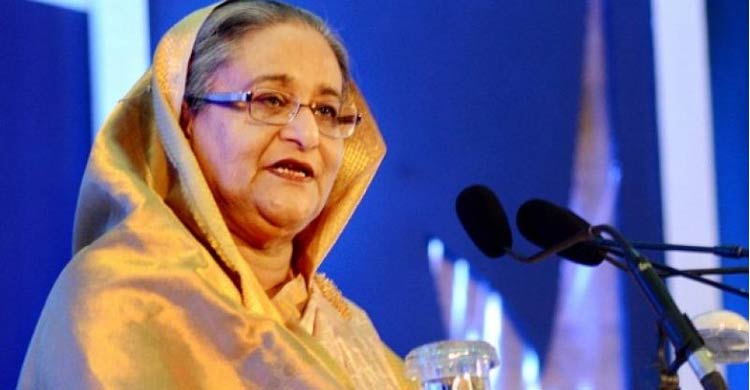SAMI
Published:2020-10-01 17:04:57 BdST
PM fears earth’s extinction, seeks steps to check human actions
Prime Minister Sheikh Hasina on Thursday said if the current actions of humans keep going on unchecked it will not only cause the extinction of other species, but also move towards ultimate extinction of itself.
"We’re not only causing the extinction of other species but we are also actually moving towards ultimate extinction of human beings if our current actions continue to be unchecked," she said.
The Prime Minister said this in her pre-recorded speech in the 'Leaders Dialogue: Harnessing science, technology and innovation, capacity building, access and benefit-sharing, financing and partnerships for biodiversity' of the 'United Nations Summit on Biodiversity' with the theme 'Urgent Action on Biodiversity for Sustainable Development' at the UN Headquarters.
Sheikh Hasina put forward four action points -- focus on future sustainability while investing and for safeguarding biodiversity, create greater public awareness through education system and research, and strengthen national legislations and monitoring mechanisms are key actions -- before the world leaders to save the planet and human beings.
The other two action points are: Global access to benefit-sharing must be ensured for the true owners of the genetic resources and associated traditional knowledge and achieving the Paris goals could be the difference between human being's extinction and survival. "We must implement them."
The Prime Minister mentioned that human beings are living in an interdependent world where all species on earth have a specific role to play in its ecosystem.
She, however said, the world's wildlife populations have fallen by an average of 68 percent just from 1970 to 2016 according to the WWF and the Zoological Society of London.
"Bangladesh is heavily dependent on freshwater and freshwater biodiversity is declining at the fastest rate in the world with 85 percent of global wetlands have already been lost since the Industrial Revolution," she said.
Sheikh Hasina mentioned that the populations of freshwater mammals, birds, amphibians, reptiles and fishes have fallen by an average of 4 percent each year since 1970. "We’re aggravating climate change and loss of biodiversity, and as a result, increasing the risk of ‘zoontic’ diseases like Covid-19."
In Bangladesh, she said, biodiversity conservation has been recognised in its Constitution as a fundamental principle of state policy and Father of the Nation Bangabandhu Sheikh Mujibur Rahman enacted the wildlife preservation order as early as in 1974. "Bangladesh is one of the few countries that enacted a law to implement the convention on Biological Diversity."
The Prime Minister mentioned that Parliament passed Bangladesh Biological Diversity Act 2017 aimed at preserving biodiversity. “We’ve declared more than 5 percent of the total terrestrial area and about 5 percent of the marine area as Protected and Ecologically Critical Areas.”
The United Nations Summit on Biodiversity was convened by the President of the General Assembly. The Summit highlighted the crisis facing humanity from the degradation of biodiversity and the urgent need to accelerate action on biodiversity for sustainable development.
It has provided an opportunity for Heads of state and government and other leaders to raise ambitions for the development of the post-2020 global biodiversity framework to be adopted at the 15th meeting of the Conference of Parties to the Convention on Biological Diversity, to be held in 2021.
This framework and its effective implementation must put nature on a path to recovery by 2030 to meet the SDGs and realise the Vision of “Living in harmony with nature”.
Unauthorized use or reproduction of The Finance Today content for commercial purposes is strictly prohibited.


